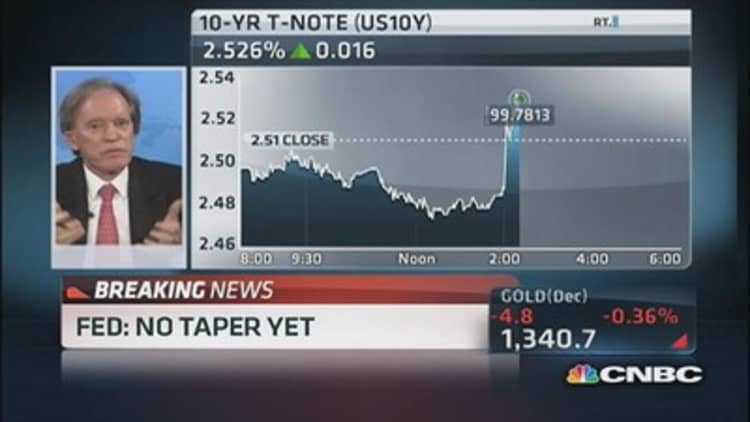The wealthiest and most privileged in the U.S. should be paying more taxes, according to Bill Gross, co-founder of Pimco and manager of the world's largest bond fund.
"Having gotten rich at the expense of labor, the guilt sets in and I begin to feel sorry for the less well-off, " he said in a client note on Thursday. "The era of taxing 'capital' at lower rates than 'labor' should now end."
Joining the list of other top-earners that have called for a more equitable tax regime – including Berkshire Hathaway boss and "Sage of Omaha" Warren Buffett and former Microsoft chief Bill Gates – Gross went on say that those in the privileged 1 percent should be willing to support higher taxes on carried interest, and capital gains readjusted to existing marginal income tax rates.
(Read More: Gross: The stock market and asset prices are 'bubbly')
Instead of the wealthy few pointing at the enormous percentage of the overall income taxes they pay, they should really be considering how much of the national income they've been privileged to make, he said.
"Smoke that cigar, enjoy that Chateau Lafite 1989. But (mostly you guys) acknowledge your good fortune at having been born in the '40s, '50s or '60s, entering the male-dominated workforce 25 years later, and having had the privilege of riding a credit wave and a credit boom for the past three decades. You did not, as President Obama averred, 'build that,' you did not create that wave. You rode it," he said.
(Read More: Gross calls DC dysfunction a 'permanent disease')
Emmanuel Saez, a professor of economics at the University of California, Berkeley, updated his research into income inequality in September which uses data from tax filings. He found that the share of the U.S.'s overall wealth for the country's richest top 1 percent is back to pre-Wall Street Crash levels. The top 1 percent's share at the end of 2012 was equal to 50.4 percent, a level higher than any other year since 1917 and even surpasses 1928, the peak of stock market bubble in the "roaring" 1920s, Saez said.
Since the financial crisis of 2008, the top 1 percent of incomes have grown by 31.4 percent while the bottom 99 percent of incomes has grown only by 0.4 percent, he said.

Gross puts down his rise in financial wealth to lower government taxes during the eras of former Presidents Reagan and George W. Bush.
"I often tell my wife Sue it's probably a Kennedy-esque type of phenomenon. Having gotten rich at the expense of labor, the guilt sets in and I begin to feel sorry for the less well-off," Gross said.
(Read more: Buffett: Debt limit is 'political weapon of mass destruction')
"Admit that you, and I and others in the magnificent '1 percent' grew up in a gilded age of credit, where those who borrowed money or charged fees on expanding financial assets had a much better chance of making it to the big tent than those who used their hands for a living," he added.
"Developed economies work best when inequality of incomes are at a minimum...by implementing more equitable tax reform that equalizes capital gains, carried interest and nominal income tax rates, we might move up the list to challenge more productive economies such as Germany and Canada."
—By CNBC.com's Matt Clinch. Follow him on Twitter @mattclinch81.


